初一一般过去时详细讲解与练习题
(完整版)初中一般过去时详细讲解与练习
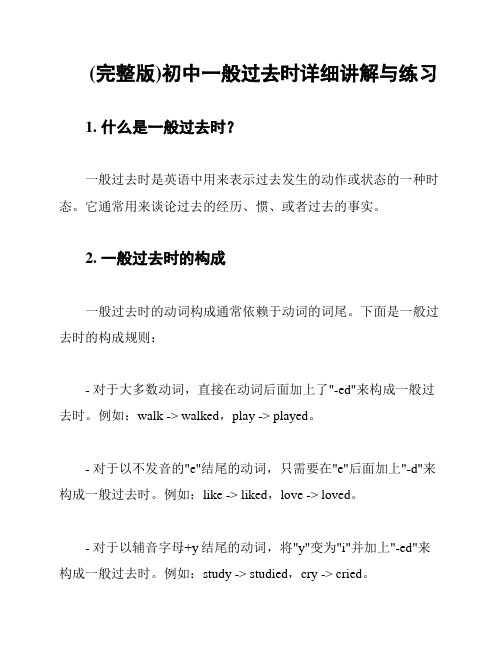
(完整版)初中一般过去时详细讲解与练习1. 什么是一般过去时?一般过去时是英语中用来表示过去发生的动作或状态的一种时态。
它通常用来谈论过去的经历、惯、或者过去的事实。
2. 一般过去时的构成一般过去时的动词构成通常依赖于动词的词尾。
下面是一般过去时的构成规则:- 对于大多数动词,直接在动词后面加上了"-ed"来构成一般过去时。
例如:walk -> walked,play -> played。
- 对于以不发音的"e"结尾的动词,只需要在"e"后面加上"-d"来构成一般过去时。
例如:like -> liked,love -> loved。
- 对于以辅音字母+y结尾的动词,将"y"变为"i"并加上"-ed"来构成一般过去时。
例如:study -> studied,cry -> cried。
- 部分动词的一般过去时需要进行不规则变化。
例如:go -> went,eat -> ate。
3. 一般过去时的用法一般过去时通常用来描述以下情况:- 过去发生的动作:I walked to school yesterday.- 过去的经历:He lived in London for five years.- 过去的事实:She was a teacher in the past.4. 一般过去时的句型练下面是一些练,帮助加深对一般过去时的理解和运用:1. 请用一般过去时填空:Yesterday, I ________ (watch) a movie at home.2. 完成句子:He _____ (visit) his grandparents last summer.3. 改写句子,使用一般过去时:I read a book yesterday. (改为否定句)4. 改写句子,使用一般过去时:They played basketball in the park. (改为疑问句)5. 总结一般过去时是用来表示过去发生的动作或状态的一种时态。
初一年级英语英语一般过去时知识点及答案解析

初一年级英语英语一般过去时知识点及答案解析一、初中英语一般过去时1.Yesterday while I was walking in the park, I saw a watch on the ground and . I gave it to a policeman.A. picked it upB. picked up itC. to pick it upD. to pick up it【答案】 A【解析】【分析】句意:昨天我在公园散步的时候我看到地上有一个手表,捡了起来,我把它交给了警察。
and是并列连词,连接两个并列谓语,根据前面的saw,可知用一般过去时;pick up是动副短语,人称代词作宾语时,代词放中间。
故选A。
【点评】本题考查动副短语的用法和一般过去时。
注意动副短语中代词的位置。
2.A bridge ________over the river last year.A. buildsB. builtC. was builtD. is built【答案】 C【解析】【分析】句意:去年河上建了一座桥。
主语是谓语的执行者时,用主动语态,主语是谓语的承受者时,用被动语态。
a bridge是谓语build的承受者,用被动语态;表示在last year发生的过去动作,用一般过去时态,故选C。
3.They don't live here any longer. They _______ to Chengdu last month.A. moveB. movedC. will moveD. are moving【答案】B【解析】【分析】句意:他们不再住在这里了。
他们上个月搬到成都了。
last month是一般过去时的时间状语,动词用过去式,故答案选B。
【点评】考查一般过去时态。
4.2016•连云港)—Did Billy and Anna find a way out at last?—Yes, they a plan and did it.A. were working outB. worked outC. are working outD. have worked out【答案】 B【解析】【分析】考查动词的时态。
(完整版)一般过去时讲解及习题
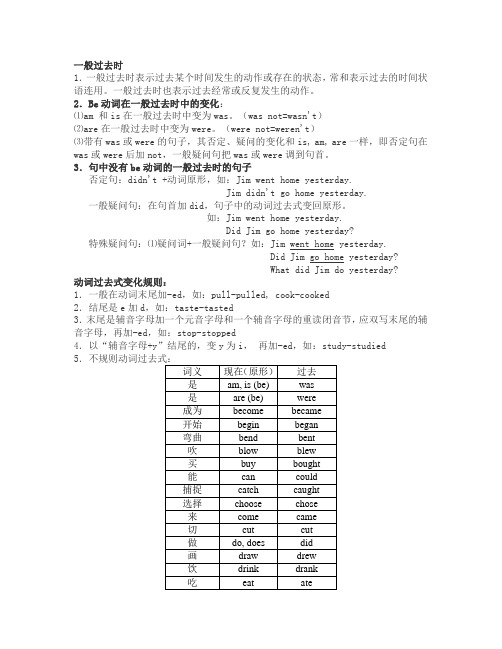
一般过去时1.一般过去时表示过去某个时间发生的动作或存在的状态,常和表示过去的时间状语连用。
一般过去时也表示过去经常或反复发生的动作。
2.Be动词在一般过去时中的变化:⑴am 和is在一般过去时中变为was。
(was not=wasn't)⑵are在一般过去时中变为were。
(were not=weren't)⑶带有was或were的句子,其否定、疑问的变化和is, am, are一样,即否定句在was或were后加not,一般疑问句把was或were调到句首。
3.句中没有be动词的一般过去时的句子否定句:didn't +动词原形,如:Jim went home yesterday.Jim didn't go home yesterday.一般疑问句:在句首加did,句子中的动词过去式变回原形。
如:Jim went home yesterday.Did Jim go home yesterday?特殊疑问句:⑴疑问词+一般疑问句?如:Jim went home yesterday.Did Jim go home yesterday?What did Jim do yesterday?动词过去式变化规则:1.一般在动词末尾加-ed,如:pull-pulled, cook-cooked2.结尾是e加d,如:taste-tasted3.末尾是辅音字母加一个元音字母和一个辅音字母的重读闭音节,应双写末尾的辅音字母,再加-ed,如:stop-stopped4.以“辅音字母+y”结尾的,变y为i,再加-ed,如:study-studied5过去时练习写出下列动词的过去式is\am_____________ fly____________ plant____________ are ____________ drink_____________ play___________ go______________ make ________ does_____________ dance__________ worry___________ ask ___________ taste_____________ eat____________ draw____________ put ____________ throw____________ kick___________ pass____________ do __________Be动词的过去时练习(1)一、用be动词的适当形式填空1.I _______ at school just now.2.He ________ at the camp last week.3.We ________ students two years ago.4.They ________ on the farm a moment ago.5.Yang Ling ________ eleven years old last year.6.There ________ an apple on the plate yesterday.7.There ________ some milk in the fridge on Sunday.8.The mobile phone _______ on the sofa yesterday evening.二、句型转换1. It was exciting.否定句:________________________________________________一般疑问句:____________________________________________肯、否定回答:__________________________________________2. All the students were very excited.否定句:________________________________________________一般疑问句:____________________________________________肯、否定回答:__________________________________________3. They were in his pocket.否定句:________________________________________________一般疑问句:____________________________________________肯、否定回答:__________________________________________Be动词的过去时练习(2)一、用be动词的适当形式填空1.I ______ an English teacher now.2.She _______ happy yesterday.3.They _______ glad to see each other last month.4.Helen and Nancy ________ good friends.5.The little dog _______ two years old this year.6.Look, there ________ lots of grapes here.7.There ________ a sign on the chair on Monday..8.Today _______ the second of June. Yesterday ______ the first of June. It _____ Children's Day. All the students ______ very excited.二、句型转换1. There was a car in front of the house just now.否定句:________________________________________________一般疑问句:____________________________________________肯、否定回答:__________________________________________肯、否定回答:__________________________________________三、中译英1. 我的故事书刚才还在手表旁边。
初中一般过去时讲解及练习答案
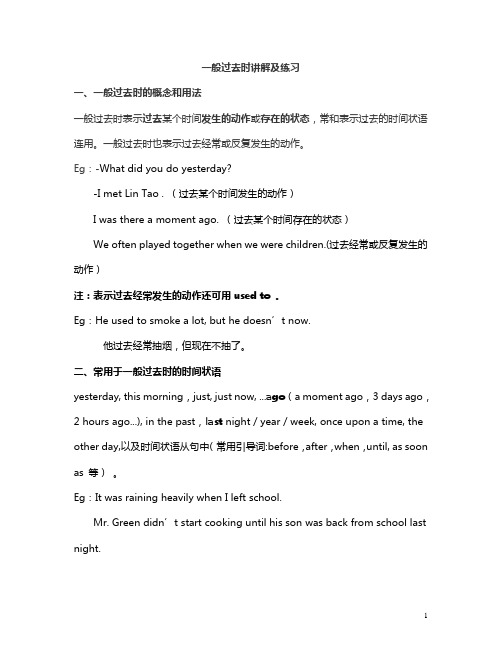
一般过去时讲解及练习一、一般过去时的概念和用法一般过去时表示过去某个时间发生的动作或存在的状态,常和表示过去的时间状语连用。
一般过去时也表示过去经常或反复发生的动作。
Eg:-What did you do yesterday?-I met Lin Tao . (过去某个时间发生的动作)I was there a moment ago. (过去某个时间存在的状态)We often played together when we were children.(过去经常或反复发生的动作)注:表示过去经常发生的动作还可用used to 。
Eg:He used to smoke a lot, but he doesn’t now.他过去经常抽烟,但现在不抽了。
二、常用于一般过去时的时间状语yesterday, this morning,just, just now, ...ago(a moment ago,3 days ago,2 hours ago...), in the past,last night / year / week, once upon a time, the other day,以及时间状语从句中(常用引导词:before,after,when,until, as soon as 等)。
Eg:It was raining heavily when I left school.Mr. Green didn’t start cooking until his son was back from school last night.三、一般过去时对谓语动词的要求一般过去时用动词的过去式构成。
即一般过去时的谓语动词要用动词的过去式。
动词过去式的构成分规则变化和不规则变化两种形式,不规则变化通常需要逐个记忆,规则变化则遵循以下原则:(1)一般在动词后加-ed。
如:play—played(玩,打), offer—offered(提供), weigh—weighed(重), destroy— destroyed(毁坏), sign—signed(签名).(2)在以字母e结尾的动词后,只加-d。
(完整版)中学一般过去时详细讲解与练习

(完整版)中学一般过去时详细讲解与练习一般过去时的使用一般过去时是英语中表示过去发生的动作、状态或惯的一种时态。
在一般过去时中,动词的过去式形式通常用来表示过去的时间。
以下是一般过去时的使用情况:1. 表示过去发生的动作一般过去时可以用来表示过去已经完成的动作。
例如:- He played soccer yesterday.(他昨天踢足球。
)- She went to the beach last weekend.(她上周末去了海滩。
)2. 表示过去的状态或特征一般过去时也可以用来描述过去的状态或特征。
例如:- They were happy when they received the news.(当他们收到那个消息时他们很开心。
)- The house was big and beautiful.(那个房子又大又漂亮。
)3. 表示过去的惯一般过去时还可以用来表示过去经常性的动作或惯。
例如:- I always ate breakfast before going to school.(我过去上学前总是吃早餐。
)- She often went for a run in the evening.(她过去经常在晚上去跑步。
)一般过去时的构成与规则动词变化- 对于大多数动词,一般过去时的构成是在动词原形后面加上-ed。
例如:play → played, work → worked。
- 对于以e结尾的动词,只需要加-d。
例如:live → lived。
- 对于以辅音字母+y结尾的动词,将y变为i然后加-ed。
例如:study → studied。
- 对于以辅音字母结尾的重读闭音节动词,重读闭音节的辅音字母要双写,再加-ed。
例如:stop → stopped。
- 一些动词的过去式形式是不规则的,需要特殊记忆。
例如:go → went, eat → ate。
一般过去时的练以下是一些练,帮助你巩固一般过去时的使用和动词形式变化:1. Fill in the blanks with the correct past tense form of the verbs:- She __________ (watch) a movie last night.- They __________ (visit) their grandparents on the weekend.- He __________ (study) math for two hours yesterday.2. Rewrite the sentences in the past tense:- I go to school every day. (改为过去时)- Jane plays tennis on Saturdays. (改为过去时)- We eat pizza for lunch. (改为过去时)- She __________ (go/went) to the party last night.- We __________ (see/saw) a movie at the cinema.- He __________ (run/ran) in the race and won.请根据上述讲解和练习进行学习和练习,巩固中学一般过去时的用法和动词形式变化。
七年级下册一般过去时讲解及练习题(完整资料).doc
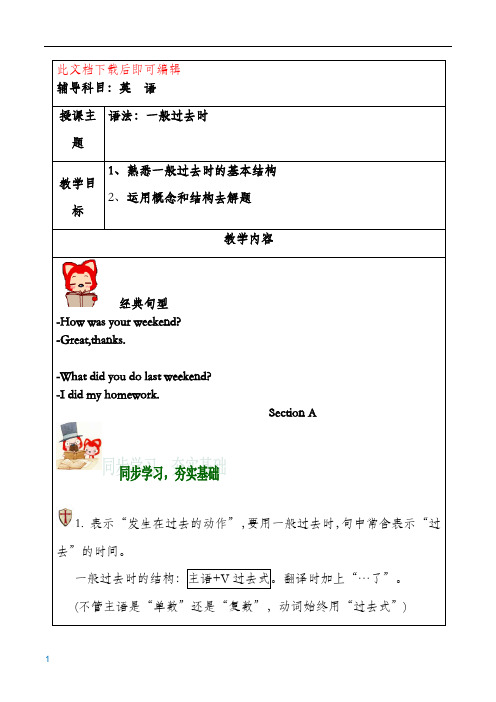
此文档下载后即可编辑辅导科目:英语授课主题语法:一般过去时教学目标1、熟悉一般过去时的基本结构2、运用概念和结构去解题教学内容经典句型-How was your weekend?-Great,thanks.-What did you do last weekend?-I did my homework.Section A1. 表示“发生在过去的动作”,要用一般过去时,句中常含表示“过去”的时间。
一般过去时的结构:主语+V过去式。
翻译时加上“…了”。
(不管主语是“单数”还是“复数”,动词始终用“过去式”)练:(1) He _________ (go) to school on foot yesterday.(2) – What did Jim do?-- He _________ (go) to the movies.(3) We ___________ (not go) to the cinema last Sunday.2. –你上个周末做了什么?-- What did you do last weekend? (did 引导,动词还原)--在星期天上午,我打了网球。
-- I played tennis on Sunday morning.拓展:时间前的介词用什么在上午/下午/晚上:in the morning/afternoon/evening在星期天上午/下午/晚上:on Sunday morning/afternoon/evening 在上个星期天上午:/ last Sunday morning (前不用冠词)在上学的白天/晚上:on school days/nightson weekends 在周末on weekdays 在工作日3. –Tina的周末怎么样?-- How was Tina’s weekend?--它很棒:It was great.–它还不错:It was not bad.–它很糟糕:It was terrible.。
初中英语 语法 七年级下 一般过去时讲解 解析及过关练习题
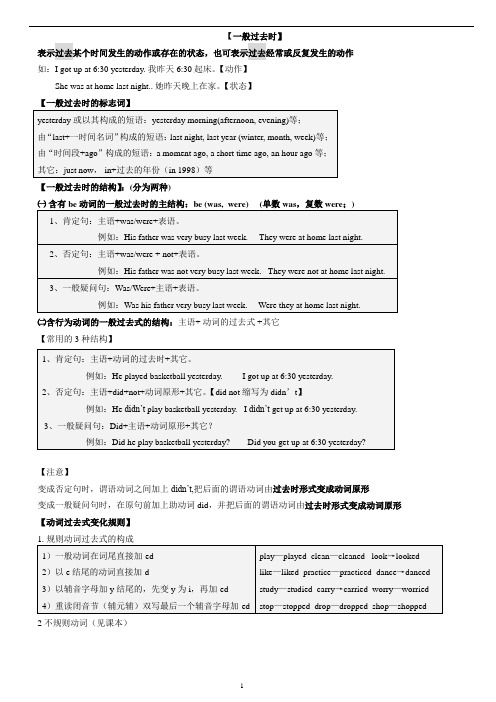
【一般过去时】表示过去某个时间发生的动作或存在的状态,也可表示过去经常或反复发生的动作如:I got up at 6:30 yesterday. 我昨天6:30起床。
【动作】She was at home last night.. 她昨天晚上在家。
【状态】【一般过去时的结构】:(分为两种)㈠含有be动词的一般过去时的主结构:be (was, were) (单数was,复数were;)㈡含行为动词的一般过去式的结构:主语+ 动词的过去式 +其它【常用的3种结构】【注意】变成否定句时,谓语动词之间加上didn’t,把后面的谓语动词由过去时形式变成动词原形变成一般疑问句时,在原句前加上助动词did,并把后面的谓语动词由过去时形式变成动词原形【动词过去式变化规则】2不规则动词(见课本)【练习】walk____ live_____ stop_____ study____ use _____ come ___ start___ worry_____ have_____ do_____ go_____tell____ see____ put____ make______ buy_____ play_____ hear_____ know_____ get_____ Lily was ten years old last year.否定句:_________________________________________一般疑问句: ______________________________They did their homework yesterday否定句:_________________________________________一般疑问句: ______________________________He went to the park last week.否定句:_________________________________________一般疑问句: ______________________________选择1.What _____they _____dinner yesterday?A. do; have forB. did; had forC. did; have forD. were; have for2.One of us ______band last month.A. leavesB. leaveC. leavedD. left3.Where _______your mother born?A. areB. wasC. wereD. is4.My mother ____________ some cakes for us last night.A. makesB. makedC. madeD.to make5.I got up _____this morning, so I _____breakfast and went to school.A. late; didn’t haveB. early; didn’t haveC. late; hadn’tD. early; hadn’t6.It ______much cold today than it _____ yesterday.A. is; isB. was; wasC. is; wasD. was; is7.He didn’t come _____goodbye to us and away.A. say; goB. say; wentC. to say; wentD. to say go8.Her pen was broken. She____ to _____a new one.A. wants; buysB. wanted; boughtC. wants; boughtD. wanted; buy9.I stayed in the sitting room and ____my friends all the time.A. talk toB. talkedC. talk aboutD. talked to10.—he go to Central Park? —Yes, he did.A. DidB. DoC. DoesD. Is11.The little girl often _______ there, last week, she _________ there, too.A. go, wentB. go, goesC. goes, goesD. goes, went。
(完整版word)初一年级英语英语一般过去时知识点含答案解析

(完整版word)初一年级英语英语一般过去时知识点含答案解析一、初中英语一般过去时1.—Are you a basketball player in you school?—Yes, I ______the team 3 years ago. I ______in it for 3 years.A. joined, wasB. was joined, amC. have joined, have beenD. joined, have been【答案】D【解析】【分析】句意:——你是你们学校的篮球运动员吗?——是的,我在3年前加入了篮球队。
我已经参加它3年了。
第一空,根据时间状语3 years ago,三年前,可知此处用一般过去时,故为joined。
第二空,根据for 3 years,可知此处用延续性动词的现在完成时,结构为have done,主语是I,故用have been。
故选D。
【点评】考查一般过去时和现在完成时。
注意根据时间状语确定动词的时态。
2.Bella, a young singer, ______ on January, 2015 because of cancer. Her death made us very sad.A. has been deadB. has diedC. was deadD. died【答案】 D【解析】【分析】句意:贝拉,一位年轻的歌手在2015年的1月因为癌症去世了。
她的死叫我们很难过。
根据时间on January, 2015可知用过去式,结合句意和语境应选D。
3.Jake _____his key in the office so he had to wait until his wife _______ home.A. has forgotten … comesB. forgot… comeC. had left… cameD. had left…would come【答案】 C【解析】【分析】句意:杰克把他的钥匙丢在办公室了,因此他不得不等到他的妻子回家。
初中英语一般过去时详解及练习题

一般过去时1.一般过去时表示在过去某一时间发生的动作或存在的状态表示时间的词有:yesterday,this morning/afternoon/evening,last+时间(上个...)last night,last Sunday,last week,last year2.一般过去时的基本结构肯定句式①主语+was/were+其他例句:He was here yesterday.②主语+动词过去式+其他例句:I went to play basketball last Sunday.否定句式①主语+was/were+not+其他例句:She wasn’t at home this morning.②主语+didn’t+动词原形+其他例句:I didn’t find you yesterday..一般疑问句①Was/Were+主语+其他例句:Were you at school last week?②Did+主语+动词原形+其他例句:Did you play football yesterday?特殊疑问句特殊疑问词(如what,why,when,where等)+一般疑问句句式例句:Where were you yesterday?What did you do yesterday?3.动词的过去式规则动词①一般情况下直接在动词后+ed例:work-worked look-looked walk-walked②以e结尾的单词直接+d例:live-lived hope-hoped use-used③以辅音字母+y结尾的,改y为i再+ed例:study-studied carry-carried以元音字母+y,直接+ed例:enjoy-enjoyed play-played⑤以重读、一个辅音字母结尾的闭音节结尾的动词,双写最后的辅音字母+ed例:stop-stopped plan-planned prefer-preferred不规则动词(书本76页表格)动词原形过去式动词原形过去式is/am was do didare were get gotbegin began go wentbuy bought have hadcome came make maderead read see sawrun ran take tookeat ate一般过去时练习题一、写出下列动词的过去式1.is/am_____2.fly_____3.plant_____4.are_____5.drink_____6.play_____7.go_____8.make_____9.do_____10.dance_____11.worry_____12.ask_____13.eat_____14.pass_____二、用所给动词的适当形式填空1.He_____(be)at home last night.2.He_____(visit)the Great Wall last year.3.We_____(have)a good time yesterday.4.We_____(go)to school by bus last year.5.Sam_____(did)the housework yesterday.6._____(do)you______(play)the violin this morning?三、选择题1.The two girls____all in Class1last year.A.areB.wasC.were.D is2.This morning he____a taxi.A.tookB.takesC.take.D is taking3.I_____to school at8o’clock yesterday.A.goB.am goingC.went D goes4.-What did you do last night?-I______a story bookA.readB.readedC.am reading D reads。
初一英语一般过去时详解及练习

第四页,编辑于星期六:十八点 三十八分。
②实意动词(行为动词)的一般过去时 肯定句:主语 + 动词过去式 +其他.
否定句: 主语 + did + not + 动词原形 +其他.
一般疑问句及其答语 : Did + 主语 +动词原形 +其他? Yes , 主语+ did. No , 主语+ didn’t .
1. look looked 2. live lived 3. stop stopped
4. carry carried 5. hope hoped 6. trip tripped
7. call called 8. finish finished 9. want wanted
10.are were 11.go went 12.have had
• 8D.idWyeoi Hu uwaabtcohugThVt alanset wSupnednayye?sterday. (变否定 句)
• She ________ ________ a new pen yesterday.
didn’t
buy
第二十页,编辑于星期六:十八点 三十八分。
用括号里动词的适当形式填空。
规则动词过去式词尾-ed的读音
读音规则
读音
例词
在浊辅音和元音后面 /d/
moved /mu:vd/
在浊辅音和元音后面 /t/
passed /pa:st/
在清辅音后面
/id/
needed /`ni:did/
清音更清 浊音更浊
一般过去时讲解,练习含答案
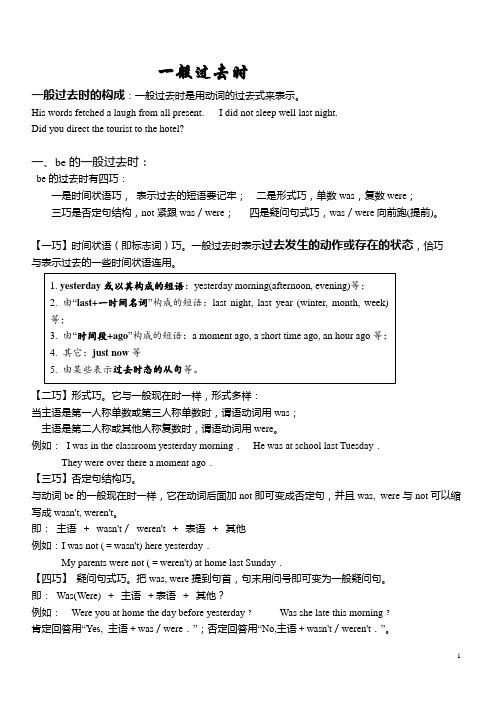
一般过去时一般过去时的构成:一般过去时是用动词的过去式来表示。
His words fetched a laugh from all present. I did not sleep well last night.Did you direct the tourist to the hotel?一、be的一般过去时:be的过去时有四巧:一是时间状语巧,表示过去的短语要记牢;二是形式巧,单数was,复数were;三巧是否定句结构,not紧跟was/were;四是疑问句式巧,was/were向前跑(提前)。
【一巧】时间状语(即标志词)巧。
一般过去时表示过去发生的动作或存在的状态,恰巧与表示过去的一些时间状语连用。
【二巧】形式巧。
它与一般现在时一样,形式多样:当主语是第一人称单数或第三人称单数时,谓语动词用was;主语是第二人称或其他人称复数时,谓语动词用were。
例如:I was in the classroom yesterday morning.He was at school last Tuesday.They were over there a moment ago.【三巧】否定句结构巧。
与动词be的一般现在时一样,它在动词后面加not即可变成否定句,并且was, were与not可以缩写成wasn't, weren't。
即:主语+wasn't/weren't +表语+其他例如:I was not (=wasn't) here yesterday.My parents were not (=weren't) at home last Sunday.【四巧】疑问句式巧。
把was, were提到句首,句末用问号即可变为一般疑问句。
即:Was(Were) +主语+表语+其他?例如:Were you at home the day before yesterday﹖Was she late this morning﹖肯定回答用“Yes, 主语+was/were.”;否定回答用“No,主语+wasn't/weren't.”。
初一英语一般过去时及练习

didn’t
– He wait for you three hours ago. waited ___________
• Who find it just now ? _____ found
• III.句型转换 – They came to China in 1990.(变一般疑问句)
• ___D__id_____ theyco__m__e____ to China in 1990?
2. live 5. hope 8. finish 11. go 14.get 17.see 20.take
3. stop 6. trip 9. want 12.have e 18.put 21.read
答案
1. look looked 2. live lived 3. stop stopped
5. Last summer we ___________ (visit) Uncle Jack.
visited
6. It ___________ (rain) almost every day last month.
7. John __r_a_i_n__ed(like) to play piano when he was in secondary school. liked
e.g. We played football yesterday. We didn’t play football yesterday. Did you play football yesterday? Yes, I did. No, I didn’t. When did you play football?
• 2.I was ill for two days last week? (同上)
(完整版)一般过去时讲解及练习
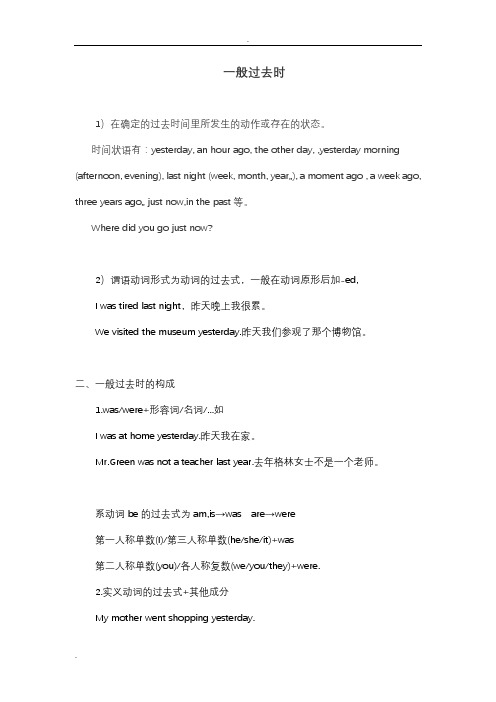
一般过去时1)在确定的过去时间里所发生的动作或存在的状态。
时间状语有:yesterday, an hour ago, the other day, ,yesterday morning (afternoon, evening), last night (week, month, year…), a moment ago , a week ago, three years ago… just now,in the past等。
Where did you go just now?2)谓语动词形式为动词的过去式,一般在动词原形后加-ed,I was tired last night,昨天晚上我很累。
We visited the museum yesterday.昨天我们参观了那个博物馆。
二、一般过去时的构成1.was/were+形容词/名词/...如I was at home yesterday.昨天我在家。
Mr.Green was not a teacher last year.去年格林女士不是一个老师。
系动词be的过去式为am,is→was are→were第一人称单数(I)/第三人称单数(he/she/it)+was第二人称单数(you)/各人称复数(we/you/they)+were.2.实义动词的过去式+其他成分My mother went shopping yesterday.我妈妈昨天去购物了。
His uncle worked in Beijing in 2014.他叔叔2014年在北京工作。
三、一般过去时的句式四、动词过去式的变化规则3 used toused to + do:"过去常常"表示过去习惯性的动作或状态,但如今已不存在。
Mother used to take a walk. (过去常常散步)二、构成及变化1. Be动词在一般过去时中的变化:am 和is在一般过去时中变为was。
人教版英语七年级英语∶英语一般过去时专练附解析推荐精选

人教版英语七年级英语∶英语一般过去时专练附解析推荐精选一、初中英语一般过去时1.—Where did you go last winter vacation?—I ________ to London with my family.A. goB. have goneC. wentD. was going【答案】 C【解析】【分析】句意:——去年寒假你去哪里了?——我和家人去了伦敦。
A.一般现在时;B.现在完成时;C.一般过去时;D.过去进行时。
did表明时态是一般过去时,所以回答用一般过去时,故选C。
【点评】考查一般过去时,注意问句和答句时态一致,故选C。
2.He to play sports, but now he is interested in soccer and volleyball.A. doesn't useB. wasn't usedC. didn't useD. didn't used【答案】 C【解析】【分析】句意:他______做运动,但是现在他对足球和排球很感兴趣。
根据句意和选项可知此题考查一般过去时态的否定句式didn't+动词原形,故选C。
【点评】此题考查一般过去时态的否定句式,平时应多归纳总结各种时态,语态和句式的结构及用法。
3.They don't live here any longer. They _______ to Chengdu last month.A. moveB. movedC. will moveD. are moving【答案】B【解析】【分析】句意:他们不再住在这里了。
他们上个月搬到成都了。
last month是一般过去时的时间状语,动词用过去式,故答案选B。
【点评】考查一般过去时态。
4.A bridge ________over the river last year.A. buildsB. builtC. was builtD. is built【答案】 C【解析】【分析】句意:去年河上建了一座桥。
人教版英语七年级英语∶英语一般过去时专练含解析

人教版英语七年级英语∶英语一般过去时专练含解析一、初中英语一般过去时1.—The bread is really delicious.—Thank you, I ________ it myself.A. makeB. madeC. will makeD. am making【答案】B【解析】【分析】句意:—面包真的很好吃。
—谢谢,我自己做的。
根据句意“面包美味可口”得知面包已做好,则说自己做的应为过去的动作,因此应使用一般过去时态。
故答案选B。
【点评】考查动词时态的辨析。
注意根据语境判断出动作是什么时候发生的从而确定时态。
2. __ terrible environment! The pollution here is even more serious than I __ .A. What a; thoughtB. How; thinkC. What an; thinkD. How; thought 【答案】 A【解析】【分析】句意:多么糟糕的环境啊!这里的污染比我想的更严重。
What 和How 都可以引导感叹句,其句型是what +a/an+形容词+可数名词单数或者what +形容词+可数名词复数或不可数名词;how +形容词+a/an+可数名词单数或how +形容词或副词。
第一个空修饰的是名词environment,是可数名词单数,故用what;根据句意可知,我所想的应是过去所想,现在已经看到了这里的环境,故第二个空应用一般过去时态。
选A。
3.He almost fell down. But he _____.A. didn'tB. doesn'tC. won't【答案】 A【解析】【分析】句意:他几乎摔倒,但是他没有。
前句动词fell是fall的过去式,说明句子用的一般过去时态,后句也还是对那件事的描述,还是用一般过去时态,否定:动词前面加didn't,同时把动词变为原形。
七年年级人教新目标英语一般过去时详细讲解与练习题
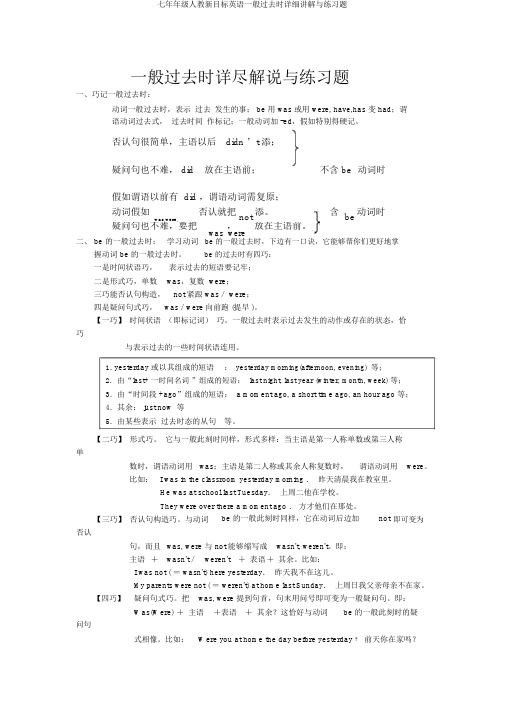
一般过去时详尽解说与练习题一、巧记一般过去时:动词一般过去时,表示过去发生的事; be 用 was 或用 were, have,has 变 had;谓语动词过去式,过去时间作标记;一般动词加 -ed,假如特别得硬记。
否认句很简单,主语以后didn ’t 添;疑问句也不难, did放在主语前;不含 be动词时假如谓语以前有 did ,谓语动词需复原;动词假如否认就把not添。
含be动词时was,were,疑问句也不难,要把,放在主语前。
was were二、 be 的一般过去时:学习动词be 的一般过去时,下边有一口诀,它能够帮你们更好地掌握动词 be 的一般过去时。
be 的过去时有四巧:一是时间状语巧,表示过去的短语要记牢;二是形式巧,单数was,复数 were;三巧能否认句构造,not 紧跟 was/ were;四是疑问句式巧,was/were 向前跑 (提早 )。
【一巧】时间状语(即标记词)巧。
一般过去时表示过去发生的动作或存在的状态,恰巧与表示过去的一些时间状语连用。
1. yesterday 或以其组成的短语:yesterday morning(afternoon, evening)等;2.由“last+ 一时间名词”组成的短语: last night, last year (winter, month, week) 等;3.由“时间段 +ago”组成的短语: a moment ago, a short time ago, an hour ago 等;4.其余: just now 等5.由某些表示过去时态的从句等。
【二巧】形式巧。
它与一般此刻时同样,形式多样:当主语是第一人称单数或第三人称单were。
数时,谓语动词用was;主语是第二人称或其余人称复数时,谓语动词用比如:I was in the classroom yesterday morning .昨天清晨我在教室里。
He was at school last Tuesday.上周二他在学校。
2019-2020学年七年级英语一般过去时详细讲解与练习题人教新目标版

2019-2020学年七年级英语一般过去时详细讲解与练习题人教新目标版一、巧记一般过去时:动词一般过去时,表示过去发生的事; be 用 was 或用 were, have,has变 had;谓语动词过去式,过去时间作标志;一般动词加-ed ,若是特别得硬记。
否定句很简单,主语此后didn ’ t 添;疑问句也不难,did 放在主语前;不含be动词时若是谓语从前有did ,谓语动词需还原;动词若是 was,were, 否定就把 not 添。
含 be 动词时疑问句也不难,要把was, were 放在主语前。
二、 be 的一般过去时:学习动词be 的一般过去时,下面有一口诀,它可以帮你们更好地掌握动词 be 的一般过去时。
be的过去时有四巧:一是时间状语巧,表示过去的短语要记牢;二是形式巧,单数was,复数 were;三巧可否定句结构,not 紧跟 was/were ;四是疑问句式巧,was/ were 向前跑 ( 提前 ) 。
【一巧】时间状语(即标志词)巧。
一般过去时表示过去发生的动作或存在的状态,恰巧与表示过去的一些时间状语连用。
1. yesterday或以其构成的短语:yesterday morning(afternoon, evening)等;2.由“last+一时间名词”构成的短语:last night, last year (winter, month, week)等;3.由“时间段 +ago”构成的短语: a moment ago, a short time ago, an hour ago等;4.其他: just now 等5.由某些表示过去时态的从句等。
【二巧】形式巧。
它与一般现在时相同,形式多样:当主语是第一人称单数或第三人称单数时,谓语动词用was;主语是第二人称或其他人称复数时,谓语动词用were。
比方: I was in the classroom yesterday morning.昨天清早我在教室里。
初一下一般过去时讲解及训练

初一过来时讲授及训练之五兆芳芳创作一般过来时1.一般过来时暗示过来某个时间产生的动作或存在的状态,常和暗示过来的时间状语连用.一般过来时也暗示过来经常或频频产生的动作.经常使用过来时间:yesterday, this morning, just now, a moment ago, in May, last night / year / week, once upon a time, the other day, before …, when – clause, in the past连用.如:What did you do yesterday? 昨天你干了什么?I met Lin Tao this morning. 今天上午我会到了林涛.I was there a moment ago. 方才我在那儿2.Be动词在一般过来时中的变更:⑴am 和is在一般过来时中变成was.(was not=wasn't)⑵are在一般过来时中变成were.(were not=weren't)⑶带有was或were的句子,其否认、疑问的变更和is, am, are 一样,即否认句在was或were后加not,一般疑问句把was或were调到句首.3.句中没有be动词的一般过来时的句子肯定句:Jim went home yesterday.把动词改成过来形式否认句:didn't +动词原形,如:Jim went home yesterday.Jim didn't go home yesterday.一般疑问句:在句首加did,句子中的动词过来式变回原形.如:Jim went home yesterday.Did Jim go home yesterday?特殊疑问句:⑴疑问词+一般疑问句?如:Jim went home yesterday.Did Jim go home yesterday?What did Jim do yesterday?动词过来式变更法则:(1) 一般在动词后加-ed.如:play—played, offer—offered, weigh —weighed, destroy— destroyed, sign—signed.(2) 在以字母e结尾的动词后,只加-d.如:like—liked, provide —provided, hate — hated, date—dated.(3) 在以“子音字母+y”结尾的动词后,则改y为i,再加—ed.如:supply—supplied, fly—flied, study— studied.(4) 在以单短元音的重读闭音节结尾且,末尾只有一个子音字母的动词后,双写最后一个子音字母,再加-ed.如:plan—planned, refer—referred, regret—regretted, ban—banned.一、单项选择:从下列各题后所给的四个选项中选择最佳答案填空.( )1. My father______ill yesterday.A. isn't B. aren't C. wasn't D. weren't( )2 ______your parents at home last week﹖A. Is B. Was C. Are D. Were( )3. The twins______in Dalian last year. They______here now.A. are; were B. were; are C. was; are D. were; was( )4.______your father at work the day before yesterday (前天)﹖A. Was B. Is C. Was D. Is( )5.—Who was on duty last Friday﹖—______.A. I am B. I was C. Yes, I was D. No, I wasn't二、请用正确动词形式填空.1. I _________ (have) an exciting party last weekend.2. ---_________ she _________(practice) her guitar yesterday?---No, she _________.3. ---What ________ Tom ________ (do) on Saturday evening?---He ________(watch) TV and __________(read) an interesting book.4. They all _________(go) to the mountains yesterday morning.5. She _________(not visit) her aunt last weekend.She ________ (stay) at home and _________(do) some cleaning.三、翻译下列句子1. 我过了一个忙碌但却刺激的周末.I _________ _________ __________ __________ exciting weekend.2. Jenny喜欢看书.昨晚她看了一本英语书.Jenny likes _________ __________. She _________ an English book last night.3. Emma每天都看电视.可是昨天他没有看.Emma__________ TV every day. But he _________ ________ ________ yesterday.4. 上周六他们做什么了?他们做作业和购物了.What ________ they _________ _________ Saturday?They _________ __________ homework and _________ __________.5. 今天早上方方得做饭,因为他父亲不在家.This morning Fangfang ____ ____ ____ ____ because his father _____ _________ yesterday.四、改写句子:1、Lucy did her homework at home.(改否认句)Lucy ________ _______ her homework at home.2、He found some meat in the fridge(冰箱).(变一般疑问句)___________ he __________ ___________ meat in the fridge?3、There was some orange in the cup.(变一般疑问句)_______ there _______ orange in the cup?4. Frank read an interesting book about history. (一般疑问句)_______ Frank _______ an interesting book about history?5. Why not go out for a walk? (同义句)_______ ________ ________ out for a walk?五、改错题1.How is Jane yesterday? _____________________2.He go to school by bus last week. ____________________________3.He often goes home at 6:00 last month. ____________________________4.I can fly kites seven years ago. ______________________________5.Did you saw him just now. ____________________________________六、完形填空Tom did not like doing his homework,because he liked to do some1things after school.And his teacher always 2a lot of mistakes in his homework.Then one day,his math teacher3 at Tom’s homework and saw that he got all his answers right.He was very 4 and surprised(惊奇).The next morning before class,he called Tom 5 his desk and 6 to him,“You got all your homework right this time.Did your father help you?”Sometimes Tom’s father helped him with his homework,7 this time he didn’t help Tom because he 8 at home.So Tom answered,“NO,Sir.He Was busy last night,so I9 to do it 10 .”()1.A.others ()2.A.made ()3.A.laughed ()4.A.please ()5.A.to()6.A.talked ()7.A.and ()8.A.isn’t ()9.A.wanted ()10.A.itself B.anotherB.foundB.knockedB.pleasedB.forB.askedB.butB.won’t beB.mustn’tB.of themC.the otherC.looked atC.lookedC.pleasureC.inC.spokeC.soC.wasn’tC.likedC.myselfD.otherD.lookedD.sawD.sadD.atD.saidD.orD.can’t beD.haveD.himself。
- 1、下载文档前请自行甄别文档内容的完整性,平台不提供额外的编辑、内容补充、找答案等附加服务。
- 2、"仅部分预览"的文档,不可在线预览部分如存在完整性等问题,可反馈申请退款(可完整预览的文档不适用该条件!)。
- 3、如文档侵犯您的权益,请联系客服反馈,我们会尽快为您处理(人工客服工作时间:9:00-18:30)。
一般过去时详细讲解与练习题一、巧记一般过去时:动词一般过去时,表示过去发生的事;be 用was 或用were, have, has 变had ;谓语动词过去式,过去时间作标志;一般动词加-ed ,若是特殊得硬记。
否定句很简单,主语之后didn’t 添;疑问句也不难,did 放在主语前; 不含be动词时如果谓语之前有did ,谓语动词需还原;动词若是was, were,否定就把not 添。
含be 动词时疑问句也不难,要把was ,were 放在主语前。
二、be 的一般过去时:学习动词be 的一般过去时,下面有一口诀,它可以帮你们更好地掌握动词be 的一般过去时。
be 的过去时有四巧:一是时间状语巧, 表示过去的短语要记牢;二是形式巧,单数was ,复数were ;三巧是否定句结构,not 紧跟was /were ;四是疑问句式巧,was /were 向前跑(提前)。
【一巧】时间状语(即标志词)巧。
一般过去时表示过去发生的动作或存在的状态,恰巧与表示过去的一些时间状语连用。
【二巧】形式巧。
它与一般现在时一样,形式多样:当主语是第一人称单数或第三人称单数时,谓语动词用was ;主语是第二人称或其他人称复数时,谓语动词用were 。
例如: I was in the classroom yesterday morning . 昨天早上我在教室里。
He was at school last Tuesday . 上周二他在学校。
They were over there a moment ago . 刚才他们在那边。
【三巧】否定句结构巧。
与动词be 的一般现在时一样,它在动词后面加not 即可变成否定句,并且was, were 与not 可以缩写成wasn't, weren't 。
即:主语 + wasn't / weren't + 表语 + 其他。
例如:I was not (=wasn't) here yesterday . 昨天我不在这儿。
My parents were not (=weren't) at home last Sunday . 上周日我父母不在家。
【四巧】 疑问句式巧。
把was, were 提到句首,句末用问号即可变为一般疑问句。
即:Was(Were) + 主语 +表语 + 其他?这恰巧与动词be 的一般现在时的疑问句式相似。
例如: Were you at home the day before yesterday ﹖ 前天你在家吗?Was she late this morning ﹖今天早上她迟到了吗?更巧的是疑问句的答语也相似,肯定回答用“Yes, 主语+was /were .”;否定回答用“No,主语+wasn't /weren't .”。
例如:—Were Wei Hua and Han Mei here just now ﹖ 刚才魏华和韩梅在这儿吗?—Yes, they were . (No, they weren't .) 是的,她们在。
(不,她们不在。
)一、单项选择: 从下列各题后所给的四个选项中选择最佳答案填空。
(10)( )1. My father ______ill yesterday .A . isn'tB . aren'tC . wasn'tD . weren't( )2. ______your parents at home last week ﹖A . IsB . WasC . AreD . Were( )3. The twins ______in Dalian last year . They ______here now .A . are; wereB . were; areC . was; areD . were; was( )4.______your father at work the day_____yesterday(前天)﹖A.Was; before B.Is; before C.Was; after D.Is; after ( )5.—Who was on duty last Friday﹖—______.A.I am B.I was C.Yes, I was D.No, I wasn't ( )6. I cleaned my classroom ___________.A with three hoursB three hours agoC in three hoursD three hours before( ) 7. I came _______ my house two days ago .A back onB back toC to backD back( ) 8 . ___________? He did some reading at home.A What does your father do yesterday eveningB What does your brother do in the schoolC What did your brother do over the weekendD Where did your brother go last Sunday( ) 9. What did you do ________ ? I went to the movies.A next morningB over the weekendC in the weekendD next Monday( ) 10. The koala sleeps _______,but gets up _________.A during the day; at the eveningB at day ;during nightC in the day ;during the eveningD during the day ; at night二、请用正确动词形式填空。
(10)1. I _________ (have) an exciting party last weekend.2. _________ she _________(practice) her guitar yesterday? No, she _________.3. What ________ Tom ________ (do) on Saturday evening?He ________(watch) TV and __________(read) an interesting book.4. They all _________(go) to the mountains yesterday morning.5. She _________(not visit) her aunt last weekend.She ________ (stay) at home and _________(do) some cleaning.6. When ________ you _________(write) this song? I __________(write) it last year.7. My friend, Carol, ________(study) for the math test and ________(practice) English last night.8. ________ Mr. Li __________(do) the project on Monday morning? Yes, he _________.9. How _________(be) Jim's weekend? It _________(be not) bad.10. ________ (be) your mother a sales assistant last year? No. she __________.三、翻译下列句子(20)1. 我过了一个忙碌但却刺激的周末。
I _________ _________ __________ __________ exciting weekend.2. Jenny喜欢看书。
昨晚她看了一本英语书。
Jenny likes _________ __________. She _________ an English book last night.3. Emma每天都看电视。
可是昨天他没有看。
Emma__________ TV every day. But he _________ ________ ________ yesterday.4. 上周六他们做什么了?他们做作业和购物了。
What ________ they _________ _________ Saturday?They _________ __________ homework and _________ __________.5. 今天早上方方得做饭,因为他父亲不在家。
This morning Fangfang ____ ____ ____ ____ because his father _____ _____ ____ yesterday.6. 你还有什么要说的?What _______ would you like _______ _______?7. 放学别忘了向老师说声再见。
Don’t forget ______ _______ _______ _______ the teacher.8. 为什么你昨晚没有看电视?Why _______ you _______ TV last night?9. 他在打扫教室的时候,发现地上有块表。
When he ______ the classroom, he ______ a watch on the ground.10.他什么时候出生的?1980年。
---When _______ he _______? ---_______ 1980.四、改写句子:(20)1、Lucy did her homework at home.(改否定句)Lucy ________ _______ her homework at home.2、He found some meat in the fridge(冰箱).(变一般疑问句)___________ he __________ ___________ meat in the fridge?3、There was some orange in the cup.(变一般疑问句)_______ there _______ orange in the cup?4. Frank read an interesting book about history. (一般疑问句)_______ Frank _______ an interesting book about history?5. Why not go out for a walk? (同义句)_______ ________ ________ out for a walk?6. Thomas spent RMB 10 on this book. (否定句)Thomas______ _____RMB 10 on this book.7. My family went to the beach last week. (划线提问)________ ________ ________ family _______ last week?8. I think she is Lily’s sister. (否定句。
